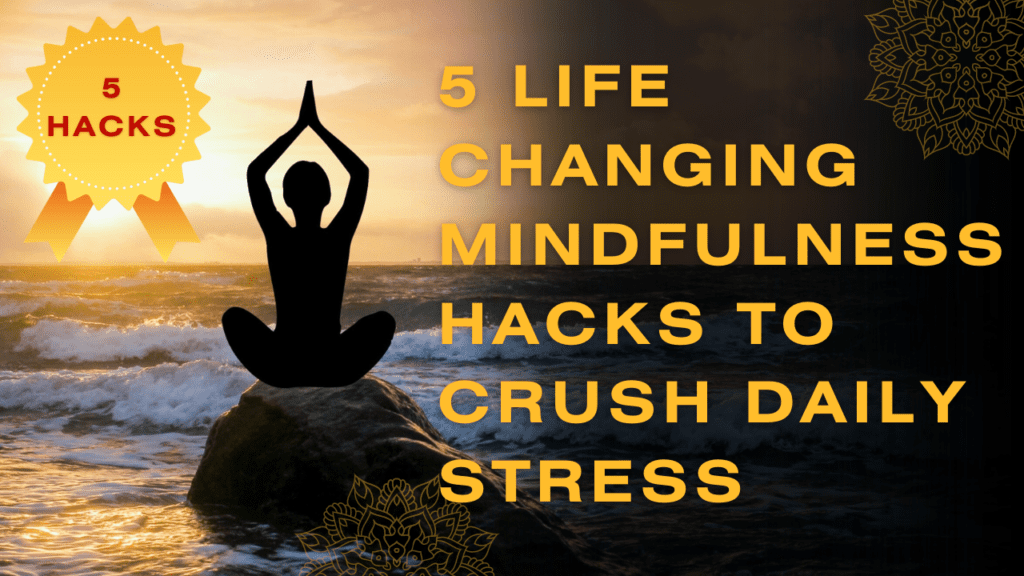Last Updated on 17 May 2024 by nidariablog.com

What is Mindfulness?
Mindfulness is the practice of deliberately focusing your attention on the present moment with an open and non-judgmental attitude. It involves becoming fully aware of your thoughts, feelings and bodily sensations as they occur as also of surrounding environment. Instead of letting your mind wander or getting caught up in past regrets or future worries, mindfulness encourages you to engage with the here and now i.e. the present moment.
Why Practice Mindfulness?
In today’s hectic world, stress is a very common experience. Creating a balance between work and family coupled with personal responsibilities often leaves little room for relaxation and self-care. Mindfulness is an ancient practice with modern day relevance and offers effective strategies for managing and reducing stress. By focusing on the present moment, mindfulness can help us break free from the cycle of chronic stress and find a sense of calm and well being. This article explores 5 great mindfulness techniques that can be easily integrated into your daily routine to help alleviate stress.
How Mindfulness Works?
Mindfulness works by shifting your attention from an autopilot mode, where you react to situations based on deep-rooted habits and patterns, to a state of conscious awareness. This shift enables you to respond to life’s challenges with greater clarity and calmness. By regularly practicing mindfulness, you can develop a heightened sense of awareness of everything happening around you. This helps you handle everyday situations in a calm and thoughtful way.
The Core Principles of Mindfulness
- Present Moment Awareness: Mindfulness is centered on the here and now. It’s about immersing yourself in the present moment, noticing what you are experiencing without trying to change it.
- Non-Judgmental Observation: When practicing mindfulness, you observe your thoughts and feelings without labeling them as good or bad. This non-judgmental stance helps you accept things as they are, reducing emotional reactivity.
- Acceptance: Mindfulness teaches acceptance of your experiences, whether they are pleasant or unpleasant. This doesn’t mean resignation, but rather acknowledging reality without resistance.
- Openness and Curiosity: Approaching each moment with curiosity and openness allows you to fully experience and appreciate your surroundings and internal states.
Here Are 5 Life Changing Mindfulness Techniques To Crush Daily Stress
Mindfulness Technique #1 – Mindful Breathing (Duration: 5-10 minutes)
- Find a serene place and sit comfortably.
- Gently close your eyes. Then, inhale deeply through your nose and feel your lungs expand.
- Exhale slowly through your mouth and release any tension.
- Concentrate on your breath and observe the sensation of air moving in through your nose and out through your mouth.
- If your mind strolls, gently concentrate back to your breathing.
Benefits: Mindful breathing calms the nervous system and anchors your awareness in the present moment, making it a powerful tool for stress reduction.
Mindfulness Technique #2 – Body Scan Meditation (Duration: 10-20 minutes)
- Lie down in a comfortable position.
- Gently close your eyes and take deep breaths a few times.
- Focus your attention to your toes and notice any sensations or vibrations.
- Slowly move your focus upwards, part by part, from your feet to your head.
- Acknowledge each part of your body without any judgment and simply observe any feelings or uneasiness.
Benefits: This technique promotes relaxation and helps identify areas of stress or tension in the body, which can then be consciously released.
Mindfulness Technique #3 – Mindful Eating (Duration: 5-10 minutes per portion of food)
- Have a small portion of food, such as an almond or a raisin or a slice of some fruit.
- Observe it carefully and note its color, texture and aroma.
- Then, slowly take a bite and focus on its taste and texture.
- Chew slowly and simultaneously savor each moment and sensation.
Benefits: Mindful eating enhances the enjoyment of food and can prevent overeating by helping you tune into your body’s hunger and fullness cues.
Mindfulness Technique #4 – Walking Meditation (Duration: 10-15 minutes)
- Look for a quiet place where you can walk without any disturbance.
- The, walk slowly and pay close attention to the sensation of each step.
- Notice how your feet feel as they touch the ground and how your body shifts with each step.
- Coordinate your breath with your steps i.e. breath-in for a few steps and breath-out for a few steps.
Benefits: Walking meditation combines movement with mindfulness, making it a great way to relieve stress while staying active.
Mindfulness Technique #5 – Mindful Listening (Duration: 5-10 minutes)
- Select a part of some music or alternatively, sit quietly and listen to the sounds around you.
- Keep your focus entirely on the sound and notice its quality, tone and any emotions it evokes within you.
- If your mind strolls, gently concentrate back to the listening experience.
Benefits: This practice enhances your ability to concentrate and can provide a calming, grounding experience.
How to Integrate Mindfulness into Your Routine
Incorporating mindfulness into your daily life doesn’t require a significant time investment. Here are some tips to effortlessly integrate these practices into your daily routine:
- Start small: Begin with just a few minutes each day and gradually increase the duration as you become more comfortable.
- Create reminders: Use sticky notes or post-it notes like a note on your mirror or a reminder on your phone to prompt mindfulness throughout the day.
- Be consistent: Try to practice the techniques at the same time each day to build a habit.
- Be kind to yourself: It is normal for your mind to wander. When it does, gently bring your focus back without self-criticism.
Broad Benefits of Mindfulness
Mindfulness offers a variety of benefits that positively impact both mental and physical health. The key advantages are as under:
- Stress Reduction – If you regularly practice Mindfulness, it will help you to reduce cortisol, the body’s primary stress hormone, as a result your stress levels will decrease. Mindful breathing and meditation techniques relaxe our body and mind and help alleviate anxiety.
- Improved Mental Clarity – Regular mindfulness practice enhances your concentration and helps you to stay in the present moment and be productive. A clear and calm mind resulting from mindfulness improves your cognitive function and decision-making abilities.
- Emotional Regulation – Mindfulness helps you become more aware of your emotions thereby aiding in better regulation and control over your emotional state. Mindfulness helps you to create a space between stimulus and response, which helps in reducing impulsive reactions and promotes thoughtful responses.
- Physical Health Benefits – If mindfulness is practiced consistently, it can help lower your blood pressure and improve your overall cardiovascular health. Also, mindfulness has been shown to boost immune function and enhance the body’s resilience to illness.
- Better Sleep Quality – Mindfulness can alleviate insomnia and enhance overall sleep quality by promoting relaxation and reducing stress. Techniques like body scan meditation can lead to deeper and more restful sleep.
- Enhanced Well-Being – Mindfulness promotes a sense of peace and contentment and contributes to overall happiness. By focusing on the present moment, mindfulness enhances appreciation for life’s small pleasures and leads to greater overall satisfaction.
- Relationship Improvements – Mindfulness cultivates the habit of active listening and empathetic communication thereby improving interpersonal relationships. Practicing mindfulness can enhance empathy and understanding towards others and helps to make stronger connections.
- Resilience to Life’s Challenges – Mindfulness equips individuals with better mechanisms to deal with life’s challenges and setbacks. By promoting a non-judgmental attitude, mindfulness helps individuals to adapt themselves more easily to changing circumstances.
- Improved Self-Awareness – Mindfulness encourages self-exploration and a deeper understanding of one’s thoughts, behaviors, and patterns. By developing a mindful attitude, individuals can easily identify areas for personal growth and development.
Conclusion
The benefits of mindfulness are vast and significant and affect various aspects of life from mental clarity and emotional regulation to physical health and relationship quality. Integrating mindfulness into your daily routines can lead to a more balanced, healthy and fulfilling life. Whether you are seeking stress relief, improved focus or greater emotional resilience, mindfulness provides you with valuable tools to enhance overall well-being.
कृपया बताएं आपको मेरी ये पोस्ट कैसी लगी। क्या आप इस तरह की और पोस्ट पढ़ना पसंद करेंगे अथवा इस पोस्ट के विषय या किसी अन्य विषय पर अधिक जानकारी लेना चाहेंगे? यदि हाँ, तो अवश्य बताएं। सोशल मीडिया पर मेरे ब्लॉग को लाईक, सब्स्क्राइब और फोलो करना ना भूलें।

Great techniques to destress